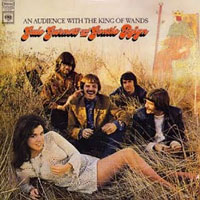Like a lot of folk-pop performers who began their careers in the early-to-mid-'60s, by the late '60s Gale Garnett seemed to have drifted into the rock and psychedelic scene, hooking up with the band the Gentle Reign. Though the music's usually far afield from the supperclub folk-pop she'd often purveyed on her numerous mid-'60s RCA albums, several things remained constant, not all of them positive. One was her lack of focus, the songs flitting all over the place, from the droning raga-rock of "Breaking Through" and the pop-soul of "Fall in Love Again" to the Northern California-flavored folk-rock of "A Word of Advice" and "You Could Have Been Anyone," the orchestrated ballads "Ballad for F. Scott Fitzgerald" and "Believe Me," and the relatively heavy blues of "That's Not the Way." Another was her mediocre songwriting, with Garnett responsible for most of the material, both alone and with occasional assistance from collaborators. Then there was, almost incongruously, her strong low voice, so deserving of better songs to work with — though as Garnett had written most of these herself, it's not as though some evil major label producer could be blamed for that. If not for that voice, in fact, this LP would be utterly anonymous period late-'60s rock, coming off as both resolutely trendy and unsure of what trend to follow, complete with a few not-strictly-necessary brief link tracks. There's just one really good song here, non-coincidentally a cover (of Fred Neil's "Dolphins"), but even there the ball is dropped, with Garnett ceding the lead vocal chores for just this one track to the far less able pipes of guitarist Bob Ingram.
(by Richie Unterberger, All Music Guide)
Best known for her 1963 hit We’ll Sing In The Sunshine and a film and TV career including recent outings such as My Big Fat Greek Wedding, Gale Garnett’s time fronting The Gentle Reign remains the most eccentric entry in her resumé. In 1968 Garnett left her folk roots behind, embarking on a whole new direction and recruiting The Gentle Reign to back her timely foray into the world of psych-rock. The results were these two offbeat and largely forgotten late 60s albums for CBS, which survive as bona fide collectors’ items from Haight Ashbury’s heyday. Sporting a vocal style that alternates somewhere between Bobbie Gentry and Grace Slick, Garnett and friends turn out an eclectic mix of styles on both albums that effortlessly move between trippy psych, folk-rock, rootsy pop and most points inbetween.
(Record Collector review)
Say what you like about the 1960s, but it would be no easy task trying to identify another decade of the late twentieth century when music as singular as this would have made its way onto record. On the surface, this is music typical of the era. It's only with repeated listening that its singularity emerges, with influences from all quarters and then some merging into a brew that's both heady and a little unsettling.
Gale Garnett has a resonant, chestnut brown voice that belies her winsome appearance on the cover, and she applies it to a range of material that might have tested the interpretative power of a more accomplished, "correct" singer. That in itself contributes in no small part to the appeal of "Ballad For F. Scott Fitzgerald" where, over an accompaniment of guitar and strings, she hints at the unlikely amalgam of Bobbie Gentry and Julie London.
Such pigeonholing as that might imply has no place here, however, especially when the nuanced "Word Of Advice" makes a political point in something other than the naive counter-cultural norm of the day. The Gentle Reign comes into its own on this one with its mixture of folk and beat group stylings.
The unassuming air of "You Could Have Been Anyone" is subverted from within by the lyrical content and Garnett's reading of it. The song's success is due in no small part to its unusual structure, but that of itself is only a measure of how far this was a band for which self-containment seems to have been some kind of watchword.
By the time of "Sausalito Heliport," both singer and band have moved on. Opening as it does with "Freddy Mahoney" the album is rather more caught up with worldly concerns than its predecessor. The subject of the title forfeits his position as a junior executive in plumbing supplies to join a rock group and grow his hair, though not necessarily in that order. Handled with a particular attitude, the theme doesn't come across as hackneyed and that's an achievement in itself.
"Deer In The City" is something else, however, evocative of a world where all the black silk socks are singing and conformity is corrosion of the mind. Whilst the latter is a hackneyed theme, to be sure, here the treatment of it is anything but, with an arrangement bordering on the baroque rendering the song a kind of one act drama.
Existing as this coupling does now as both of its time and outside it, the age turns a spotlight upon it which reveals only a singular work for which comparison does little.
(Nic Jones,www.allaboutjazz.com, 06.08.2008





